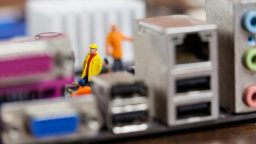Robotics has come a long way, from simple machines designed to perform repetitive tasks to sophisticated robots that can perform complex activities with a level of precision and autonomy. Today, robots are being integrated into industries like healthcare, manufacturing, and even household tasks. As the capabilities of robots continue to expand, so too do the ethical questions surrounding their use. From concerns about job displacement to the impact on human relationships, the rise of robotics raises several complex ethical issues. Let’s explore some of the key ethical concerns surrounding robotics and what they mean for society.
- Job Displacement and Economic Impact
One of the most significant ethical concerns surrounding robotics is the potential for job displacement. As robots become more capable, they are increasingly being used to replace human workers, particularly in sectors such as manufacturing, logistics, and even customer service. While automation can improve efficiency and reduce costs, it also raises the question of how workers whose jobs are replaced by robots will adapt.
The ethical dilemma lies in balancing the benefits of automation with the potential harm to individuals who lose their jobs. Without proper planning, the widespread use of robots could exacerbate economic inequality, especially for workers in low-skill positions. The challenge will be to ensure that workers are provided with opportunities to retrain and reskill for new roles, while also considering how automation can be implemented in a way that benefits society as a whole.
- Safety and Security
As robots become more autonomous, ensuring their safety and security is an ongoing ethical concern. From self-driving cars to robots operating in high-risk environments, there is always the risk that these machines could malfunction, causing harm to humans or property. The question arises: who is responsible if a robot causes an accident or injury?
In the case of autonomous vehicles, for example, who is accountable if a self-driving car crashes? Is it the manufacturer, the programmer, or the owner of the vehicle? These types of questions highlight the importance of developing ethical guidelines and regulatory frameworks that address safety standards for robots, particularly those that interact with humans or have the potential to cause harm.
Additionally, robots can be vulnerable to cyberattacks. Hackers may attempt to take control of autonomous robots, which could lead to disastrous consequences. Ensuring the security of robotic systems and protecting them from malicious interference is a crucial ethical responsibility that developers must take seriously.
- Privacy Concerns
Robots are increasingly equipped with sensors, cameras, and microphones that allow them to collect vast amounts of data about their environment and the people they interact with. In industries like healthcare, where robots are used to monitor patients, this raises significant privacy concerns. How is this data stored? Who has access to it? And how can we ensure that personal information is protected?
The use of robots in surveillance also raises questions about the right to privacy. For example, robots used for security purposes may be equipped with facial recognition software, which could be used to monitor individuals without their knowledge or consent. This has the potential to infringe on civil liberties and could be misused by governments or corporations for surveillance purposes.
Ethically, it is important that the collection and use of data by robots be transparent, and that individuals’ privacy rights are respected. Data collected by robots should be safeguarded and used only for the purpose for which it was intended, with strong oversight and regulations in place to prevent misuse.
- Emotional and Social Impact
As robots become more integrated into daily life, particularly in roles that involve human interaction, such as healthcare and companionship, there are concerns about the emotional and social impact. Robots designed to provide care for the elderly, for example, might be able to assist with physical tasks or monitor vital signs, but can they replace human companionship and emotional support?
The ethical concern here is whether relying on robots for emotional and social interactions could undermine human relationships and lead to feelings of isolation. While robots can provide companionship in certain contexts, they cannot replace the genuine emotional connection that humans experience with each other. There’s also the risk that some individuals, particularly the elderly or vulnerable, could become overly dependent on robots, potentially neglecting meaningful human connections in the process.
Moreover, there are ethical questions about how robots are programmed to interact with humans. Can robots be designed to act ethically? Should they be programmed to simulate emotions and form relationships with humans? These are difficult questions that will require careful consideration as robots take on more human-like roles in society.
- The Risk of Bias in Robotics
Robots, particularly those powered by artificial intelligence (AI), can inherit biases present in the data they are trained on. If the data used to train robots reflects societal biases, such as racial, gender, or socioeconomic biases, the robots may inadvertently perpetuate these biases in their decision-making processes.
For example, a robot programmed to assist in hiring might favour candidates from certain demographics over others, based on biased training data. This could exacerbate existing inequalities and perpetuate discrimination in important areas like employment, healthcare, and law enforcement.
To avoid this, it’s crucial that robotics developers ensure that the data used to train robots is diverse and free from bias. Additionally, there must be oversight and transparency in the development of AI algorithms to ensure that they are making fair and unbiased decisions.
- Autonomous Weaponry and Warfare
The development of autonomous robots for military applications is one of the most controversial and ethically charged issues in robotics. Robots equipped with lethal weapons could potentially make life-and-death decisions without human intervention, raising questions about accountability and the moral implications of such technology.
If robots are deployed in combat, there is a risk that they could be programmed or malfunction in ways that lead to unintended harm. There is also the concern that autonomous weapons could be used by governments or rogue states in ways that violate international law or ethical standards. The ethical dilemma here is whether it is morally acceptable for robots to make decisions about who lives and dies in a combat situation.
As this technology advances, international regulations and treaties may be needed to govern the use of autonomous weapons and ensure that they are used responsibly and ethically.
- Rights and Personhood for Robots
As robots become more advanced, particularly in terms of AI, questions about their status and rights may arise. Should robots with advanced AI be granted any rights? Could they be considered persons in the same way humans are? While we are far from having robots with consciousness or emotions, the development of highly sophisticated AI could prompt society to reconsider how we view robots.
The idea of giving robots rights or legal personhood raises complex ethical and legal questions. If a robot is capable of thinking and making decisions, does it deserve the same protections as a human being? Or, should it always be considered the property of its creator or owner? These questions challenge our understanding of personhood and rights in the context of non-human entities.
Conclusion
The ethical issues surrounding robotics are vast and complex, touching on everything from job displacement and privacy concerns to the social impact of robots in our lives. As robots become increasingly autonomous and integrated into our daily routines, it is crucial that developers, policymakers, and society as a whole engage in thoughtful discussions about the ethical implications of this technology. By addressing these concerns proactively, we can ensure that robotics is used in ways that benefit humanity while minimising potential harm. As robotics continue to evolve, the challenge will be to strike a balance between innovation and ethical responsibility, ensuring that the future of robotics is one that aligns with our values and respects human dignity.





